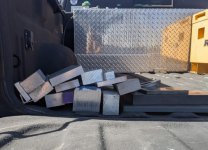The problem with the cheap indicators, is that they work fantastic. They’re repeatable, and measure identically to name brand indicators.
Until the day they don’t.
Usually, within a year or so, they just stop being repeatable, or measuring accurately. But after a year of using them, you’ve come to trust them, and you won’t realize you’re screwed until it’s too late.
It all depends, I have had brand name tools go tits up on calibration too.
As a perk of the job at many places I worked, Engineers and Mechanics were required to have all dial indicators, etc cal checked and then marked with a QA Sticker semi annually.
They did not care if it was a $20 dial indicator/micrometer or a $200 dial indicator. But it had to pass cal.
Most of my stuffs is back from the 1990s, and it passed cal year after year.
Point is , you are kidding yourself to assume a high dollar indicator is always true if you dont cal check it annually
[edit] I'll add that of course the better stuffs, should be better.
Last edited:



